Discover how to reward your restaurant staff's hard work with end-of-year bonuses and boost employee morale.
Understanding the Importance of End-of-Year Bonuses
End-of-year bonuses are an essential way to recognize and appreciate the hard work and dedication of your restaurant staff. It is a gesture that shows your employees that their efforts do not go unnoticed and are valued by the management. By providing end-of-year bonuses, you can boost employee morale and motivation, leading to increased productivity and loyalty.
In the restaurant industry, where the work can be demanding and stressful, it is crucial to acknowledge the contributions of your staff. End-of-year bonuses serve as a tangible reward for their efforts throughout the year and can also serve as an incentive for them to continue performing at their best.
Moreover, end-of-year bonuses can help create a positive work environment and foster a sense of camaraderie among your staff. When employees feel appreciated and rewarded, they are more likely to feel satisfied with their job and develop a stronger commitment to your establishment.
Determining the Budget for Bonuses
Before distributing end-of-year bonuses, it is essential to determine the budget you can allocate for this purpose. Consider factors such as your restaurant's financial performance, profitability, and overall budget constraints. You want to ensure that the bonuses are feasible and sustainable for your business.
Start by reviewing your financial records and analyzing your revenue and expenses. Look for patterns and identify any areas where you can allocate funds for employee bonuses. It may be helpful to consult with your accountant or financial advisor to determine a reasonable amount to allocate for bonuses.
Keep in mind that the size of the bonuses should be fair and reasonable based on your employee's performance and contributions. It is important to avoid setting unrealistic expectations or creating disparities among your staff. A well-planned budget will allow you to reward your employees while also maintaining the financial stability of your restaurant.
Designing a Fair Bonus Structure
When designing the bonus structure for your restaurant staff, it is crucial to ensure fairness and transparency. You want to create a system that rewards employees based on their performance and contributions to the success of your establishment.
Consider implementing performance-based bonuses, where employees receive bonuses based on specific metrics such as customer satisfaction ratings, sales targets, or individual achievements. This approach motivates employees to strive for excellence and provides a clear framework for evaluating their performance.
Another option is to distribute bonuses based on tenure, where employees receive bonuses based on the number of years they have been with your restaurant. This approach recognizes loyalty and long-term commitment.
You can also consider a combination of both performance-based and tenure-based bonuses to create a well-rounded system that acknowledges both individual achievements and loyalty.
Regardless of the structure you choose, it is crucial to communicate the criteria and process for determining bonuses to your staff. This transparency helps build trust and ensures that everyone understands how the bonuses are awarded.
Communicating the Bonus Program to Staff
Once you have designed the bonus program, it is essential to effectively communicate it to your staff. Transparency and clarity are key to ensuring that everyone understands the criteria, expectations, and timeline for receiving bonuses.
Schedule a staff meeting or send out a company-wide email to explain the bonus program. Clearly outline the performance metrics or criteria that will be used to determine bonuses. Provide examples and answer any questions that your staff may have. It is important to address any concerns or confusion to avoid misunderstandings or resentment.
Additionally, emphasize the significance of the bonuses and how they reflect your appreciation for their hard work. Reinforce the message that the bonuses are a reward for their contributions and serve as motivation for continued excellence.
Regularly update your staff on their progress towards earning bonuses throughout the year. This communication keeps them engaged and motivated, knowing that their efforts are being recognized and rewarded.
Celebrating and Distributing the Bonuses
The final step in the process is to celebrate and distribute the end-of-year bonuses to your restaurant staff. This is an opportunity to create a positive and festive atmosphere, where employees can feel valued and appreciated.
Consider hosting a special event or gathering to announce and distribute the bonuses. This can be a holiday party or a dedicated celebration solely focused on recognizing the achievements and hard work of your staff. Make it a memorable occasion that highlights their contributions and the positive impact they have had on your restaurant's success.
During the event, personally thank each employee for their efforts and explain how their individual contributions have made a difference. This personalized recognition adds a meaningful touch to the bonus distribution process and further motivates employees to continue excelling in their roles.
Finally, ensure that the bonuses are distributed promptly and accurately. Double-check the calculations to avoid any errors or discrepancies. Your attention to detail will demonstrate professionalism and reinforce the value you place on your employees.
What does giving out bonuses mean when filing your business's taxes?
Giving out bonuses to employees can have implications when filing your business's taxes. Bonuses are considered taxable income for employees, which means that they are subject to federal and state income taxes, as well as Social Security and Medicare taxes. As an employer, you are responsible for withholding these taxes from the bonus amount and reporting them on the employees' W-2 forms.
Find a full guide to restaurant taxes here.
Additionally, you may also be required to pay additional employer taxes on the bonus amount. It is important to consult with a tax professional or accountant to ensure that you are properly fulfilling your tax obligations when providing bonuses to your employees. By understanding the tax implications of giving out bonuses, you can effectively plan and budget for these expenses while also rewarding and motivating your staff.
%20BLANK%20(9).jpg?height=400&name=Blog%20Header%20(smaller)%20BLANK%20(9).jpg)



